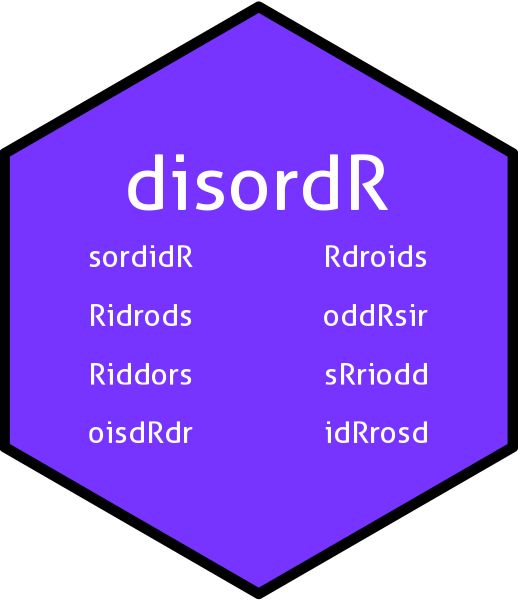

Ordinary R vectors are unsuitable for working with values of
associative maps because elements of an R vector may be accessed by
reference to their location in the vector, but associative maps are
stored in arbitrary order. However, when associating keys with values
one needs both parts to be in 1-1 correspondence, so one cannot dispense
with the order entirely. The disordR package includes a single
S4 class, disord. This class allows one to
perform only those operations appropriate for manipulating values (or
keys) of associative maps.
A useful heuristic is that one is only allowed to access or modify a disord object using a python list comprehension. The idea is to prevent “illegal” operations on values (or keys) of associative maps, whose order is undefined or at best implementation-specific, while allowing sensible operations.
disord package in
useI will illustrate the package by a few examples of legal and illegal
code. First create a simple disord object:
set.seed(0)
a <- rdis() # a random disord object
a
#> A disord object with hash 5ebacdc1b1f8f614c40e83e0e70ded255e386bea and elements
#> [1] 0.8966972 0.2655087 0.3721239 0.5728534 0.9082078 0.2016819 0.8983897
#> [8] 0.9446753 0.6607978
#> (in some order)We may perform various operations on this object:
a+4
#> A disord object with hash 5ebacdc1b1f8f614c40e83e0e70ded255e386bea and elements
#> [1] 4.896697 4.265509 4.372124 4.572853 4.908208 4.201682 4.898390 4.944675
#> [9] 4.660798
#> (in some order)
a > 0.5
#> A disord object with hash 5ebacdc1b1f8f614c40e83e0e70ded255e386bea and elements
#> [1] TRUE FALSE FALSE TRUE TRUE FALSE TRUE TRUE TRUE
#> (in some order)
a[a<0.2]
#> A disord object with hash 2a520942c9be99a9a6f25ace481cc0c0942c617d and elements
#> numeric(0)
#> (in some order)with no difficulty. But if we try to find elements of a
with a particular offset or offsets, the system returns an error:
a[1]
#> Error in .local(x, i, j = j, ..., drop): if using a regular index to extract, must extract each element once and once only
a[c(2,3)]
#> Error in .local(x, i, j = j, ..., drop): if using a regular index to extract, must extract each element once and once onlyThis is because the elements of a are stored in an
implementation-specific order and there is no such thing as the “first”
element. We may manipulate elements of a by reference to
their values but not by their position in the vector:
a[a<0.1] <- 0 # round small elements down
a
#> A disord object with hash 5ebacdc1b1f8f614c40e83e0e70ded255e386bea and elements
#> [1] 0.8966972 0.2655087 0.3721239 0.5728534 0.9082078 0.2016819 0.8983897
#> [8] 0.9446753 0.6607978
#> (in some order)Replacement methods can access subsets where this makes sense:
x <- disord(1:10)
x
#> A disord object with hash 65e11d78de79b7f584068ad856749e3748cb837c and elements
#> [1] 1 2 3 4 5 6 7 8 9 10
#> (in some order)
x[x<3] <- x[x<3] + 100
x
#> A disord object with hash 65e11d78de79b7f584068ad856749e3748cb837c and elements
#> [1] 101 102 3 4 5 6 7 8 9 10
#> (in some order)disord
objectsIf we create another disord object, b:
b <- rdis()
b
#> A disord object with hash ac586d2c83d7942aeb32d50d64c333e631f6912f and elements
#> [1] 0.62911404 0.06178627 0.20597457 0.17655675 0.68702285 0.38410372 0.76984142
#> [8] 0.49769924 0.71761851
#> (in some order)Then a and b have the same length, but
adding them vectorially is forbidden because the order of their elements
is implementation-specific:
a+b
#> Error in a + b: consistent(e1, e2) is not TRUEAlso, replacement methods that access cross-referenced locations are forbidden:
a[b < 0.4] <- 5
#> Error in .local(x, i, j = j, ..., value): consistent(x, i) is not TRUE(observe carefully that a[b<4] <- 5 is legal).
However, sometimes one knows that two disord objects have the
same ordering (perhaps a is the key, and
b the value, of an associative array). In this case one may
cross-reference them provided that the hash codes of the two objects
agree:
a <- rdis()
b <- disord(runif(9),hash(a))
a
#> A disord object with hash e6cd849ae088b5cd33fec9ef3aadae14003e3ab9 and elements
#> [1] 0.9919061 0.3800352 0.7774452 0.9347052 0.2121425 0.6516738 0.1255551
#> [8] 0.2672207 0.3861141
#> (in some order)
b
#> A disord object with hash e6cd849ae088b5cd33fec9ef3aadae14003e3ab9 and elements
#> [1] 0.01339033 0.38238796 0.86969085 0.34034900 0.48208012 0.59956583 0.49354131
#> [8] 0.18621760 0.82737332
#> (in some order)See how a and b have the same hash code.
Then, although the elements of a and b are
stored in an implementation-specific (and thus unknown) order, whatever
order it is is the same in both objects and they are relatable:
a+b
#> A disord object with hash e6cd849ae088b5cd33fec9ef3aadae14003e3ab9 and elements
#> [1] 1.0052964 0.7624231 1.6471361 1.2750542 0.6942226 1.2512396 0.6190964
#> [8] 0.4534383 1.2134874
#> (in some order)
a[b < 0.5]
#> A disord object with hash c953b2ab2cf81ee8b581dec44ee805f54da7888b and elements
#> [1] 0.9919061 0.3800352 0.9347052 0.2121425 0.1255551 0.2672207
#> (in some order)
a[b < 0.2] <- b[b < 0.2]
a
#> A disord object with hash e6cd849ae088b5cd33fec9ef3aadae14003e3ab9 and elements
#> [1] 0.01339033 0.38003518 0.77744522 0.93470523 0.21214252 0.65167377 0.12555510
#> [8] 0.18621760 0.38611409
#> (in some order)A disord object is comparable with python arrays with the proviso that one is only allowed to access or manipulate elements via list comprehensions. See the following python session:
~ % python3
Python 3.9.5 (default, May 4 2021, 03:33:11)
[Clang 12.0.0 (clang-1200.0.32.29)] on darwin
Type "help", "copyright", "credits" or "license" for more information.
>>> from numpy import *
>>> a = random.rand(5)
>>> b = random.rand(5)
>>> a
array([0.13275574, 0.07243463, 0.0543058 , 0.36633955, 0.73795801])
>>> b
array([0.14934221, 0.11321413, 0.6135964 , 0.53558058, 0.6396702 ])
>>> [i**2 for i in a]
[0.017624086607707354, 0.005246776214236293, 0.002949120389839953, 0.1342046637421116, 0.54458202262916]
>>> [i+j for i,j in zip(a,b)]
[0.28209795105056, 0.18564876373593042, 0.6679022004516395, 0.901920128499422, 1.377628206483919]
>>> Note that in the last line zip() is used to relate
a and b which is accomplished in the package
by explicitly setting the hash code.